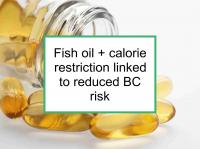A new study has reported that combining consumption of the omega-3 fatty acid eicosapentaenoic acid with intermittent calorie restriction reduced the development of mammary tumors more than either strategy alone in a mouse model of breast cancer. The main sources of eicosapentaenoic acid are fatty fish and fish oil.
The study included four groups of MMTV-HER-2/neu transgenic mice, mice who have been bred to develop mammary tumors spontaneously. From the age of 10 weeks onwards, half of the mice were given a diet with fat derived from soybean oil and the other half were fed a diet including 71.75% of fat calories in the form of eicosapentaenoic acid (for simplicity, we are going to refer to this as fish oil, however note that fish oil also contains another omega-3 fatty acid, docosahexaenoic acid, as well as other nutrients). The animals were further divided into ad libitum (allowed to eat “at will” without restriction) and intermittent caloric restriction groups.
Mice in intermittent calorie restriction groups were fed calories equal to the intake of the at will groups for three weeks, followed by three weeks of calories equal to 50% of the at will levels. The mice were weighed each week and carefully examined for mammary tumors. The six-week pattern of restricted/normal feeding was continued until the mice were 55 weeks old or were euthanized because of mammary tumors.
The at will soybean oil and fish oil groups were found to eat similar amounts and had similar patterns of weight gain. The body weights of the intermittent calorie restriction soybean oil and fish oil groups did not differ greatly from each other, but were significantly lower than the at will mice groups. Mammary tumors appeared first in the at will soybean oil group, then in the at will fish oil, intermittent calorie restriction soybean oil and the intermittent calorie restriction fish oil groups.
Survival was also found to be significantly longer in the intermittent calorie restriction fish oil group than among all the other groups. The proportion of mice that were tumor-free at the end of the study and the tumor burden per animal were also significantly lower. Several proteins that are part of the nuclear factor kappa B (NFκB) pathway (known to influence breast cancer development) were down-regulated by fish oil.
The authors conclude that mammary tumor inhibition is significantly increased when intermittent calorie restriction and fish oil are combined as compared to either intervention alone or no intervention. The study also identified the NFκB pathway as a potential pathway of interest for inhibition of mammary tumor formation: understanding how this pathway is affected may aid in the development of drugs that could be used for breast cancer prevention.
